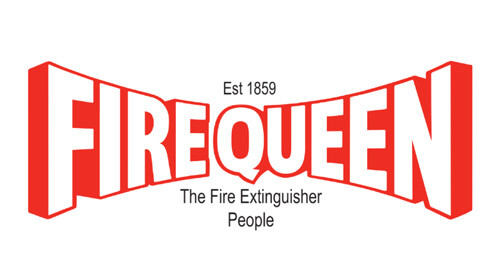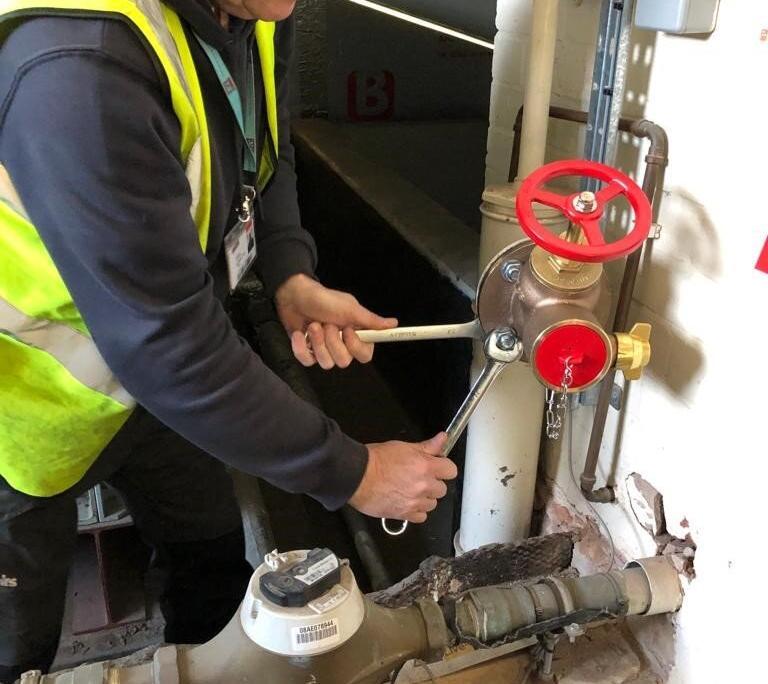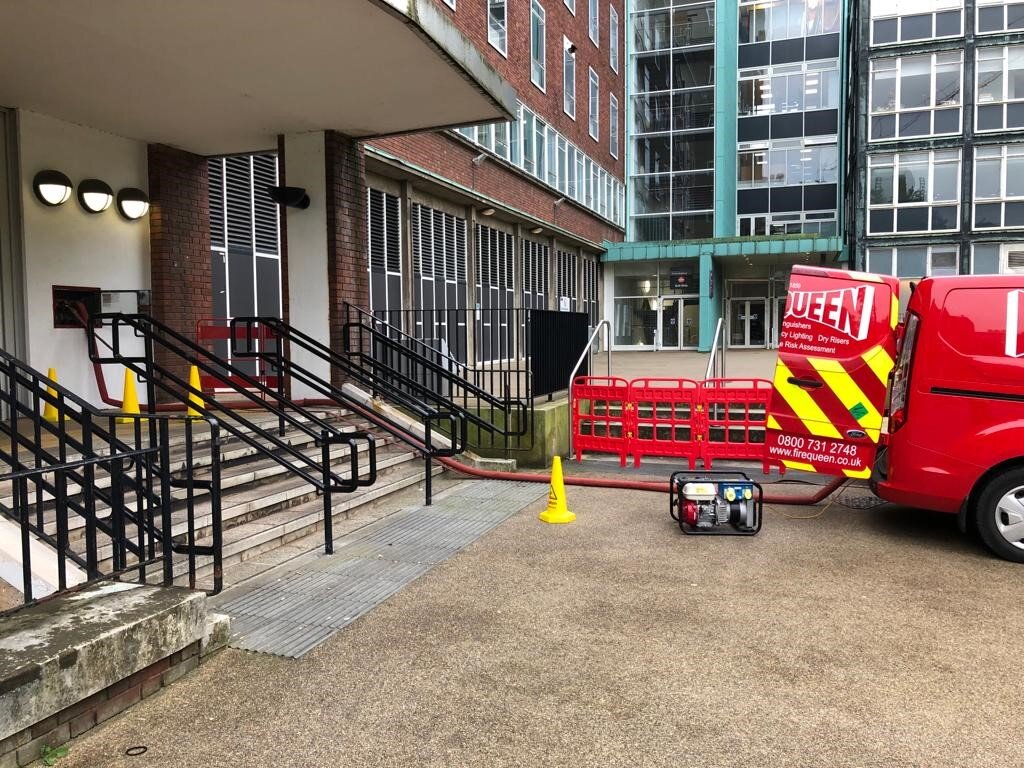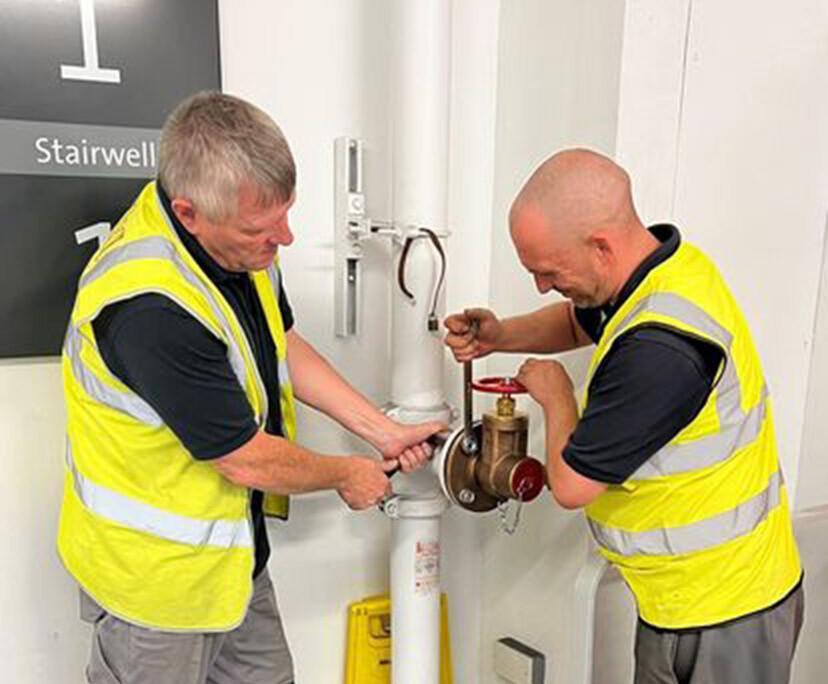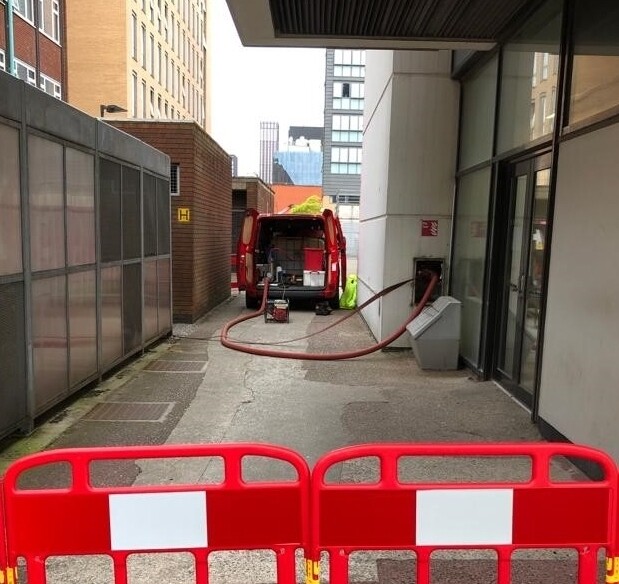Fire Queen Limited carries out Planned Maintenance to Dry Riser Systems across the UK; our specialists have experience in all types of buildings & environments.
We are proud of our customer focus; our Technicians are fully trained, providing you with an excellent service & expert knowledge. Contact us to find out why our maintenance solutions have a reputation for excellence.
Dry Rising Mains are intended for use by the Fire Brigade; they facilitate the rapid deployment of water to help fight & prevent the spread of fire in a building. Dry Risers are uncharged mains, often fitted into staircase enclosures or other suitable positions, with outlet valves on each floor & inlets fitted at ground floor level to enable the Fire Brigade to connect to the water supply.
Dry Riser maintenance ensures correct operation in the event of an emergency. Since 1989, it has been the responsibility of the owner or occupier of a building to ensure Dry Riser systems are in optimum working order. Dry Riser Maintenance system tests are designed to simulate the conditions & stresses that would be required should the Fire Brigade make similar connection.
Dry Riser Testing is Required Every Six Months
Regular Dry Riser Testing is essential to ensure the equipment is consistently in good working order. Servicing & Maintenance of the equipment should also be carried out at this time. The Fire brigade may rely on Dry Risers in their fight against fire; the importance of a working Dry Riser can never be underestimated. Vital minutes may be wasted, resulting in damage to property & placing your team, customers &/or tenants in danger.
Maintenance ensures the system will transfer water, at sufficient flow rate, without leaks or pressure loss. In addition to the static pressure test, the Dry Riser system requires testing & operation of all inlets, landing valves, drain valves, door hinges & locking arrangements.
Customer Support Team
Fire Queen Limited has experience in the Maintenance & Testing of all configurations of Dry Riser systems & in many different designs of buildings & applications. A purpose built test rig is used which enables the maintenance team to access the system with minimum of inconvenience to the building occupiers. Our vehicles also carry a self contained water supply & pumping facilities, enabling the static pressure test to be carried out from the outside of a building in a fraction of the time it would take to simulate the test using hand pumps & a local water supply. This procedure also minimises any risk to health & safety, which may be caused by the running of hoses through the inside of a building.
By combining your Dry Riser Maintenance with our Fire Extinguisher Maintenance, Fire Alarm Servicing & / or Emergency Lighting Maintenance plans, we can offer significant cost savings.
Contact our Customer Support Team on 0800 731 2748 to arrange a free survey or discuss your requirements with a Technical Advisor.
Alternatively, please use the form below for any Dry Riser Maintenance queries & we will respond quickly.
How often should a Dry Riser be Tested?
BS9990: 2015 requires dry risers to be tested under pressure annually with a visual inspection every six months.
Fire Queen Limited scheduled service visits every six months, alternating between
Major Service
- Inspect all parts of the system for compliance with BS9990: 2015
- Fully open & close each landing valve and grease mechanical workings
- Replace any worn or missing parts including washers, straps, padlocks, gaskets etc.
- Charge the system with water & pressurise
- Monitor for a period of no less than 15 minutes
- Drain all water from the system & replace seals, caps & plugs
- Provide a detailed test report & certificate
Minor Service
- All of the above without, the pressure test
Why should you test your Dry Riser System?
The person responsible for a building or site is legally required to maintain all fire fighting equipment, including Dry Risers. British Standards codes of practice state inlets, landing valves, drain valves & landing valve boxes should be inspected every six months & that wet tests be carried out annually, when the riser can be checked for leaks.
Criminals & vandals can target buildings, removing vital components or damaging parts of dry riser systems; potentially a life threatening in the event of fire.
Systems which are not maintained are at risk of failing if placed under pressure.
